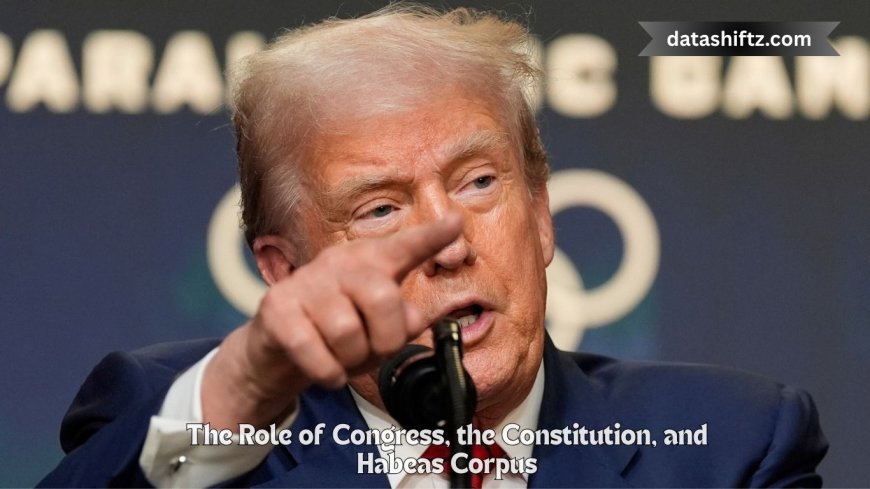The Role of Congress, the Constitution, and Habeas Corpus

Understanding the Legal Foundations of American Democracy
In an era of rapid political developments and legal disputes, the principles that form the foundation of American governance are more relevant than ever. Terms like Congress, the Constitution, and Habeas Corpus are regularly cited in the news, but how do these concepts interact, and why are they so vital today?
In this blog post, we will explore the role of Congress in shaping legal frameworks, the enduring authority of the U.S. Constitution, and the significance of the writ of habeas corpus in current events. We will also look at how these foundational elements influence the daily headlines and political debates of our time.
The U.S. Congress: Legislative Power and Its Boundaries
The United States Congress is the legislative arm of the federal government, consisting of the House of Representatives and the Senate. Created by Article I of the Constitution, Congress has the power to make laws, declare war, regulate commerce, and control the federal budget.
However, the Constitution also places limitations on Congress to ensure a balance of power among the three branches of government—executive, legislative, and judicial.
One such limitation relates to habeas corpus, a legal safeguard that prevents unlawful detention.
What Is Habeas Corpus?
Definition and Constitutional Basis
Habeas corpus, Latin for “you shall have the body,” is a legal action that allows individuals to seek relief from unlawful imprisonment. It compels the detaining authority to justify the detention in court.
This right is enshrined in Article I, Section 9, Clause 2 of the U.S. Constitution:
“The privilege of the writ of habeas corpus shall not be suspended, unless when in cases of rebellion or invasion the public safety may require it.”
The Constitution intentionally places this clause in Article I, indicating that it is Congress—not the executive branch—that has the authority to suspend habeas corpus, and only under extreme circumstances.
Recent News: Habeas Corpus in Modern Context
The Guantanamo Bay Dilemma
One of the most prominent recent debates involving habeas corpus concerns the detention of individuals at Guantanamo Bay. For years, civil liberties groups have argued that indefinite detention without trial violates habeas corpus protections.
While the Supreme Court has ruled in Boumediene v. Bush (2008) that detainees do have the right to habeas corpus, questions about Congressional authority and national security remain unsettled.
Immigration Detention Cases
In 2025, several high-profile immigration cases have also brought habeas corpus into the spotlight. Non-citizens detained by immigration authorities have sought habeas relief in federal courts, arguing that prolonged detention without individualized hearings violates constitutional guarantees.
These modern cases show how a centuries-old legal principle continues to shape policy and individual rights today.
Congress and Habeas Corpus – Then vs. Now
| Aspect | Historical Context | Current Context (2025) |
|---|---|---|
| Authority to Suspend | Only in cases of rebellion or invasion | Rarely exercised, debated in security cases |
| Notable Suspensions | Civil War (Lincoln), WWII (Japanese Internment) | Guantanamo detentions post-9/11 |
| Role of Congress | Must pass legislation for suspension | Often leaves detention policy to executive |
| Court Involvement | Minimal in early history | Active judicial review in modern era |
The Constitution: A Living Document Under Constant Scrutiny
The U.S. Constitution remains the supreme law of the land. However, its interpretation has evolved through judicial review, amendments, and Congressional legislation. As Congress crafts new laws and responds to modern crises, constitutional principles are tested daily.
In 2025, ongoing legal battles concerning data privacy, reproductive rights, and criminal justice reform all raise questions about the scope of constitutional protections, including due process and equal protection.
Constitutional Rights at Issue in Today’s Headlines
-
Habeas Corpus – Prevents unlawful detention
-
Due Process (5th and 14th Amendments) – Guarantees fair legal procedures
-
Equal Protection (14th Amendment) – Prohibits discriminatory laws
-
Freedom of Speech (1st Amendment) – Central in protest and tech regulation debates
-
Right to Counsel (6th Amendment) – Focus of criminal justice reform
Congress’s Role in the Digital Age
As society evolves, so must legislative responses. Congress today faces unprecedented challenges in regulating technology, surveillance, and civil liberties—all while respecting constitutional constraints.
For example:
-
AI Surveillance: Congressional hearings have examined whether mass data collection infringes on privacy and Fourth Amendment rights.
-
Immigration Legislation: New bills aim to streamline the asylum process while facing criticism for potential due process violations.
-
Prison Reform: Proposed legislation seeks to limit solitary confinement and ensure timely hearings—directly related to habeas corpus rights.
Why It Matters Today
The constitutional principle of habeas corpus is not an outdated relic; it is a living protection of individual freedom against arbitrary state power. As Congress continues to legislate on complex modern issues—from national security to civil rights—its respect for constitutional limits is essential to preserving democracy.
Moreover, judicial rulings and public advocacy highlight that citizens are not powerless. Courts have acted when Congress or the executive overstep, showing the strength of the Constitution in action.
Conclusion: Democracy in Practice
In today’s fast-moving political environment, understanding the relationship between Congress, the Constitution, and habeas corpus is not just academic—it’s essential. As debates rage over immigration, surveillance, national security, and human rights, these foundational principles are put to the test daily.
Whether it’s a Supreme Court ruling on detention rights, a congressional hearing on surveillance powers, or a protest for due process at the border, the conversation always circles back to the fundamental question: Are we upholding the Constitution and protecting individual liberty?






























